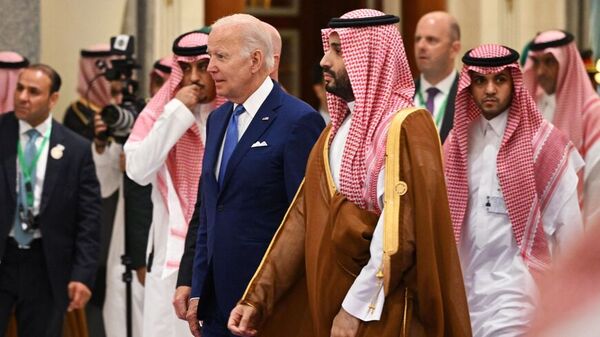Saudi Crown Prince and Prime Minister Mohammed bin Salman has offered to resume financial aid to the Palestinian Authority, if the PA can crack down on militant groups in the West Bank.
Al Monitor analysis: The PA, for its part, is willing to support US-mediated diplomacy between Israel and Saudi Arabia, if Israel gives up some control over West Bank towns and dismantles Israeli settlements there, as Axios reported. These potentially game-changing steps place the Israeli-Palestinian conflict back in the center of regional diplomacy, hooked to the next phase of normalization.
This is a turnaround, and a good one. The dividends of US-Saudi diplomacy are on full display these days. Credit Washington and Riyadh for putting behind a scratchy first year after US President Joe Biden took office. It’s hard to imagine any type of diplomacy moving in the Middle East — whether Israel-Palestine, Iran, or China — without a fluid US-Saudi relationship. And that seems to be what we have.
The latest flurry gives PA President Mahmoud Abbas a possible lifeline, but also puts him on the spot. Saudi engagement comes as Abbas is in the midst of a makeover of Palestinian leaders and rising unpopularity, as Daoud Kuttab documents in his must-read newsletter. It may be too little, too late, as the PA hangs on by thread, and sometimes barely that, in an increasingly radicalized West Bank, especially in the camps in Nablus and Jenin.
The spotlight also shifts to Israeli Prime Minister Benjamin Netanyahu. He badly wants to cement his legacy by establishing ties with Saudi Arabia. For a while he seemed to be getting a pass, as the action turned, and still turns, on the Saudi asks of the United States — more and even better US weapons packages, a security agreement, and a civil nuclear deal — all heavy lifts, requiring Congressional buy-in.
While Netanyahu was willing to swallow the demands of his hardline coalition partners on a divisive judicial reform bill, he now must contend with their vocal opposition to any concessions to the Palestinians. Agreeing to hold off on annexing parts of the West Bank, as Netanyahu did with a center-right government to secure the Abraham Accords in 2020, is one thing. Dismantling settlements and ceding territory to a weakened PA, with a far-right government, during an uptick in Palestinian attacks on Israelis (35 Israeli Jewish citizens killed so far this year), is another. The mood is dark, and as Ben Caspit writes, “the calls for revenge play well with young, radical settlers who carry out almost daily attacks on their Palestinian neighbors.”
There are no illusions here about the difficulties ahead to close the deal on Israel-Saudi normalization. But Washington and Riyadh, and by extension Tel Aviv and Ramallah, are having all the right conversations about all the right things. Given the increasingly desperate situation in the West Bank, the declining prospects for a two-state solution, the collapse of the Iran nuclear deal, and the challenge of China, US-Saudi diplomacy is more vital then ever.








Share your opinion
US-Saudi diplomacy gives lifeline to Palestinian leadership, two-state solution